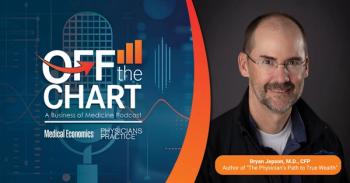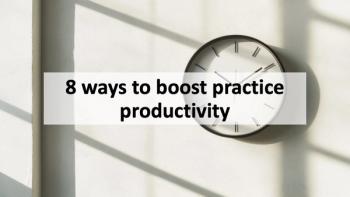
Four Steps to a Better Work Lunch
Lunch is an important time of day for physicians; giving them a short respite from patient care. Don't be tempted to use it to catch up on patient care.
Lunch can be a wonderful time of day, much more than the mere ingestion of needed calories. If approached correctly, lunch can be a time for personal renewal, at least on a small scale. How often, however, do we force lunch in between work-related activities, such as dealing with staff, handling patients, reviewing files, and looking up things online?
Wolfing down otherwise nutritious food, in part, negates the value of what you are ingesting. If you are giving lunch short shrift, from a physiological standpoint, you might not be deriving the optimal nutritional benefits from the food you consume.
Here are some ideas for clearing away the time and space to have a relatively leisurely lunch that will help fortify you to handle the rest of the day's activities:
1) If you haven't already done so, schedule lunch each day. Go to your appointment calendar, or scheduling software, and mark those times in which you will have lunch. Make it longer than it physically takes you to consume whatever you choose to eat. A 30-minute lunch time, for example, if you brought your own food, is usually more than enough time to finish what you have. Typically, a brown bag lunch takes only 12 to 18 minutes to consume.
2) If you eat at a nearby restaurant or food place, make plans so that you're in and out relatively easy. Perhaps you can have a standing reservation on Tuesdays with one establishment, and then do the same for other days, with other establishments.
3) Whenever you choose to eat for lunch, ensure that it is not fast food. There is no need for me to recount the horrors of consuming questionable hamburger products, French fries, and other foods laced with bad fats, sugars, and salts - all of which you do not need to consume. The cumulative effect of consuming fast food has been well-documented and not a path you wish to follow.
4) Having lunch with a friend or staff person is permissible, but keep the conversation light. Lunch is not the time to dwell upon heavy duty issues. It is a good time to bond with others, to talk about topics unrelated to the office, or to simply shoot the breeze.
5) Ensure that you have the capability to return from lunch in a leisurely manner. No matter how unhurried your consumption of food might have been, if you have to hustle back to the office for a patient appointment or a key staff meeting, once again, you might negate the benefits of everything that transpired before your frenzied return.
A more rewarding time
With the right mindset, and a few simple guidelines such as those discussed above, increasingly, you can turn your lunch time into something a bit more rewarding, if not much more, than it has been. You owe it to yourself to have enjoyable lunches, and to receive the associated benefits in terms of job satisfaction, effectiveness, and personal zest.
Newsletter
Optimize your practice with the Physicians Practice newsletter, offering management pearls, leadership tips, and business strategies tailored for practice administrators and physicians of any specialty.






